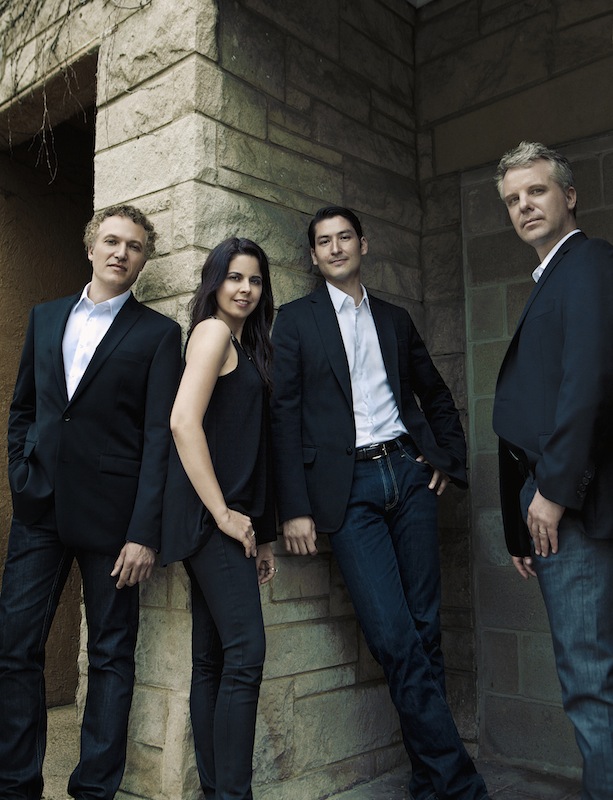Pacifica Quartet makes a triumphant return to Mandel Hall
For the first time in seventeen years, the Pacifica Quartet performed at the University of Chicago Friday night not as one of the University’s ensembles-in-residence. Their appearance at Mandel Hall was the final event of UC Presents’ “Classic Concert Series,” and the four members delivered the goods in a substantial program of repertory staples.
The Pacifica began the evening with Mozart’s Quartet in D Minor, K. 421, the only one of the so-called “Haydn Quartets” in a minor key. The four players—first violinist Simin Ganatra, second violinist Sibbi Bernhardsson, violist Masumi Per Rostad, and cellist Brandon Vamos—took a spacious approach to the opening Allegro moderato that allowed them to highlight its subtle harmonic shadings to great effect. The ensuing Andante, by contrast, had a lyrical, narrative quality evocative of Mozart’s vocal writing.
The Menuetto’s many dotted pick-up rhythms had consistent snap, underscoring the movement’s martial aspect, and the coquettish Trio sparkled with coy playing from Ganatra. (Ganatra announced last year that she would be leaving the quartet, but apparently—and fortunately—has had a change of heart.) The closing Allegro ma non troppo is a series of variations of a lilting sarabande, and the Pacifica persuasively plumbed its darker hues.
While there was little fault to find in the Pacifica’s Mozart performance, by the end of the night it was hard to avoid feeling they were more simpatico with the other two composers on the program: Beethoven and Shostakovich. The latter’s Quartet No. 3 in F Major rounded out the first half and received superb treatment.
The opening Allegretto of Shostakovich’s Op. 73 begins with a seemingly innocent, almost quirky march, that gets increasingly mercurial and even unhinged as the movement progresses. The Pacifica players fully inhabited these schizoid moods, perhaps nowhere more so than in the final race to the movement’s close, which seemed simultaneously cheerful and crazed.
The Moderato con moto saw impeccable ensemble playing as the musicians’ desiccated up-bows were flawlessly aligned, seemingly without effort, and the manic central Allegro non troppo was given guttural force in a searing rendition. The melancholy dirge of the Adagio had fitting angst and gravitas before seguing into the lugubrious jig of the final Moderato. The Pacifica traversed this movement’s wide emotional spectrum with poise before delicately allowing the music to evaporate in a gossamer ascension.
The second half of the concert was dedicated to Beethoven’s Quartet in C Major, Op. 59, No. 3, one of the “Razumovsky” set written during the same period as the composer’s “Eroica” Symphony and Violin Concerto. The work’s wildly dissonant introduction still sounds bizarre to modern ears, and the Pacifica did not apologize for its strangeness in their intense reading, while the main Allegro vivace proceeded with vitality and élan.
The second movement is marked Andante con moto quasi allegretto and its mood is as ambivalent as its tempo marking. Its murky opening sounds almost Hungarian, while the body of the movement ranges from optimistic to plangent. The Pacifica elegantly navigated all these shifts, not superimposing any generic sensibility on this decidedly ambiguous music.
By contrast, the Menuetto is straightforwardly sunny, and was given commensurately magnanimous treatment by the quartet, while its Ländler-esque trio had a rustic, peasant feel. The closing Allegro molto was taken at breakneck speed. The four Pacifica members’ playing was fleet and incisive, this music’s substantial technical demands all but an afterthought in their assured hands.
UChicago Presents’ next performance is 3 p.m. Sunday at the Museum of Contemporary Art. Part of the Contempo Series, the program is entitled “Whisper(s)” and features percussionist Matthew Duvall, Third Coast Percussion, and guests. chicagopresents.uchicago.edu/
Posted in Performances





